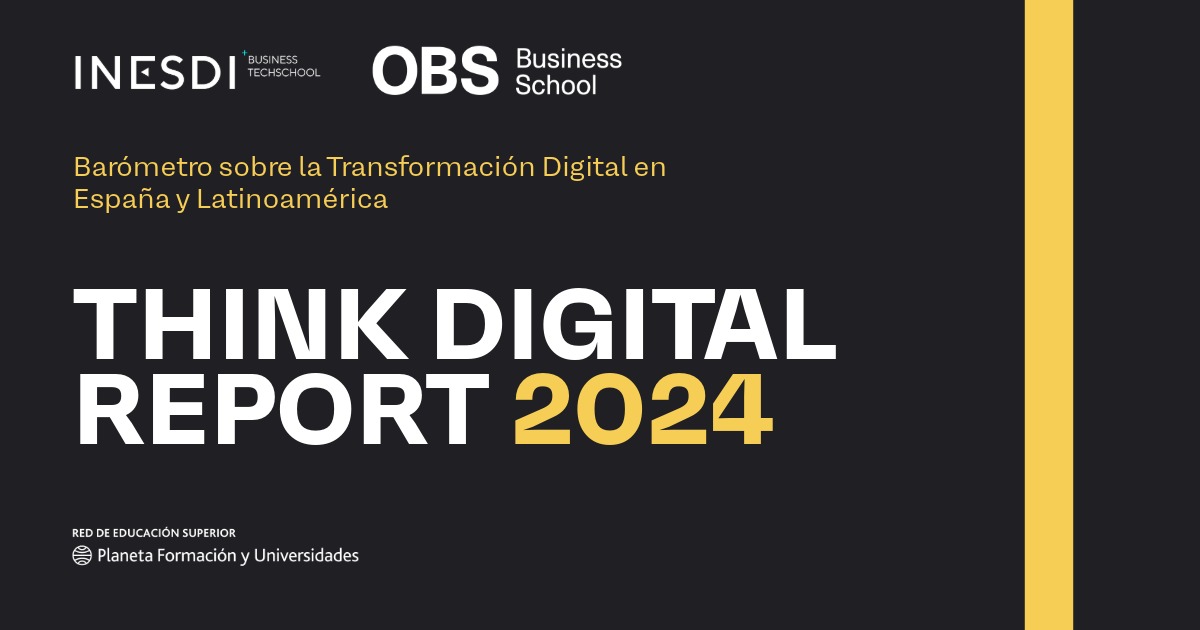
OBS-INESDI Report: Think Digital Report
Spain Among the Global Leaders in Digital Maturity

February 2025 – OBS Business School and Inesdi Business Tech School present the Think Digital Report 2024, a barometer of digital transformation in Spain and Latin America conducted since 2021.
The findings from this study reveal that digital transformation continues to consolidate not only within the business sector but also as a driver of disruption in markets and society at large. Spain has made significant strides in digital transformation, increasing its index from 4.2 in 2021 to 7.6 in 2024. The country now ranks among the top nations in terms of the proportion of companies engaged in this process: an impressive 81% of organizations in Spain have reported initiating their digital transformation journey, demonstrating a strong commitment to innovation and adaptation to the demands of the contemporary business environment. However, only 7% consider themselves to have reached an advanced level of digital culture, highlighting the need for a more balanced approach that prioritizes cultural transformation alongside technological investment.
Up to 56% of Companies Have Integrated Digital Experts
Spain stands among the global leaders in digital maturity, with 49% of companies classified as being at advanced or disruptive levels, marking a significant increase from 2023. Notably, the exceptional preparedness of Spanish professionals has played a crucial role in this progress. The country’s ongoing commitment to training and skill development has positioned it as a beacon in the global landscape of business innovation.
As digital challenges evolve, Spain remains at the forefront by cultivating a highly skilled workforce capable of driving change and seizing the opportunities of the digital age. This year, up to 56% of companies have incorporated digital experts as an essential part of their transformation process, while also investing in the development of internal talent. However, despite these advancements, organizational culture and the lack of digital skills remain the primary barriers to initiating and advancing digital transformation within Spanish companies.
Most Valued Skills by Organizations
Among the most sought-after technical skills are big data management and analysis (53%) and software development (47%). In terms of soft skills, collaboration and innovation are particularly valued. Design Thinking remains the most widely adopted methodology among Spanish companies in their digital transformation efforts.
The digitalization of products, services, and channels (57%) and innovation in products and services (54%) are identified as the primary drivers of sector-wide transformation.
Artificial Intelligence: A Strategic Pillar
Artificial Intelligence (AI) continues to gain traction, with more than half of companies progressing in its implementation, particularly in the following areas:
- Process automation (61%)
- Decision support, providing business leaders with more accurate and timely insights for strategic and operational decisions (47%)
- Innovation in products and services, enabling companies to develop more creative and market-aligned solutions (45%)
- Cost optimization and reduction (44%)
- Customer experience personalization, enabling more relevant and engaging interactions through advanced data and behavioral analysis (43%)
These findings confirm that AI is no longer an emerging technology but a strategic pillar for organizations. Moreover, 33% of companies implementing AI report that it has fostered a stronger digital culture within their teams.
Despite this progress, Spain lags behind in AI adoption compared to the global average (26% vs. 33%). In particular, the use of AI to enhance supply chain management remains significantly lower in Spain (17%) compared to the global average (25%).
In terms of organizational practices, Scrum methodology has been adopted by 40% of companies, solidifying its position as the most widely implemented agile framework. However, many organizations still rely on traditional methods, indicating a gap in the adoption of modern organizational models.
Additionally, remote work increased by 38%, while distributed work arrangements grew by 28% over the past year.
Content written by:
Carmen García-Trevijano
OBS Business School's Press Office
